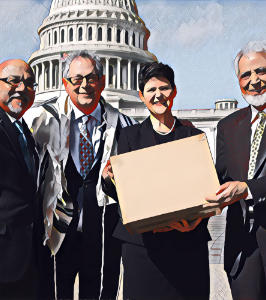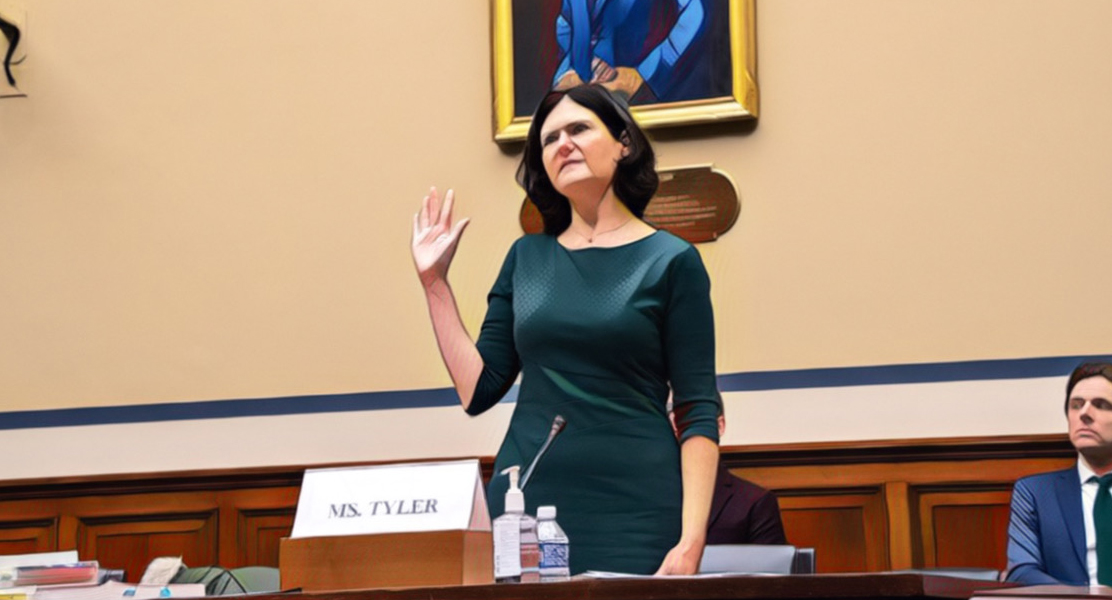Located just two blocks from the U.S. Capitol in Washington, D.C., and across the street from the Hart Senate Office Building, BJC works closely with Congress in church–state matters.
Some of what we do makes the news; much of our impact, however, takes place behind the scenes. In any given legislative session, we may lead congressional briefings, meet directly with lawmakers and their staffs, analyze new legislation, testify at hearings or build broad advocacy coalitions to sustain religious liberty.
Looking for ways to take action?
Our nation’s public schools educate approximately 90% of American schoolchildren, helping us learn how to live together as one community. Proposals to elevate one religious belief over others or use taxpayer dollars for tuition or other expenses at private, often religious, schools pop up frequently in state and federal bills.
BJC has long worked with a number of religious, public education, and civil liberties groups to oppose any kind of publicly funded voucher program. Simply put, religious teachings should be paid for by voluntary contributions – not through compulsory taxation. Vouchers violate the freedom of conscience of taxpayers, who have the right to insist that the government remain neutral in matters of faith. In addition, for any religious academy that might benefit financially, government funding comes with strings attached.
BJC also works to make sure our public schools are free from Christian nationalism, including opposing bills that would mandate the posting of Scripture in classrooms or bills that would conflate the role of a “chaplain” for a school counselor. We also support clear federal guidelines on religion in public schools.
- Contact your members of Congress about troubling school voucher proposals
PODCAST: The trouble with school vouchers, part one and part two (December 2023) - With battles in Texas, Oklahoma and Louisiana, public school classrooms are troubling religious liberty hotspot (Nov. 26, 2024)
- Religious liberty in public schools (Printable PDF)
- PODCAST: The Ten Commandments (May 4, 2023)
- News: Texas Legislature passes chaplain bill, doesn’t pass Ten Commandments bill (June 5, 2023)
- BJC applauds Biden administration’s school prayer guidance (May 15, 2023)
- Strong public schools fight Christian nationalism by Jennifer Hawks (March 1, 2023)
- BJC’s advocacy in Kennedy v. Bremerton (2022)
- BJC’s advocacy in Carson v. Makin (2022)
- Public schools getting short shrift (again) in coronavirus relief package by Jennifer Hawks (August 4, 2020)
- Voucher-funded religious education: A threat to religious liberty by Jennifer Hawks

BJC was founded on the principle of religious liberty for all, including people of every faith and those who do not claim a religious tradition.
One example: BJC supports the Save Oak Flat From Foreign Mining Act (H.R. 1351), which was introduced in the previous Congress. It would keep an Indigenous sacred space currently within the boundaries of Tonto National Forest protected from total destruction by a foreign mining operation.
We also oppose efforts to infuse Christian nationalism into our public schools or other areas, including through problematic proposals that would force Bible teaching or mandate the posting of the Ten Commandments. Hear more in this podcast from 2024. One religious belief should not be elevated in the law over others.
Those are just two of many projects BJC undertakes to defend religious freedom for everyone.
RELATED
- PODCAST: Oklahoma and Texas try to force Bible teaching in public schools (Oct. 31, 2024)
- Visit our website page about our work to save Oak Flat, including our support of the Save Oak Flat from Foreign Mining Act (H.R. 1351) in the 118th Congress.
- PODCAST: Public schools and Christian nationalism (March 2, 2023)
- Priorities of the Christians Against Christian Nationalism campaign (March 2023)
- Save our church from destruction: Chairman Terry Rambler of the San Carols Apache Tribe on Oak Flat (July 13, 2021)
- Biden reverses travel ban on first day in ‘victory for faith freedom’ (Jan. 21, 2021)
- News: Reintroduced Freedom of Religion Act Would Bar Religious Test for Entry to U.S. (2019)
- Video: Amanda Tyler comments on SCOTUS travel ban ruling

In countries around the world, blasphemy laws exist that criminalize religious dissent, stifle religious expression and undermine human rights. They are often used to silence religious minorities and punish political opponents, fostering religious intolerance, discrimination and violence. In December 2020, both the U.S. House and U.S. Senate passed bipartisan resolutions that called for the State Department and the administration to prioritize the repeal of such laws in foreign policy. BJC supported both measures (H.Res. 512 and S.Res. 458). These laws still exist in more than 80 countries, so the work continues as we support our global neighbors seeking faith freedom for all.
RELATED
- Learn more about H.Res. 512 and S.Res. 458 (PDF handout)
- U.S. House supports international religious freedom resolution by Jennifer Hawks (Dec. 7, 2020)
- Read BJC’s testimony to Congress supporting H.Res. 512 (January 28, 2020)
- Lynn Brinkley shares about meeting with congressional staff to discuss the repeal of blasphemy laws
BJC is a leading voice in fighting various attempts to repeal the “Johnson Amendment” — the provision in the tax code that prohibits 501(c)(3) nonprofits from partisan campaigning. This law currently allows houses of worship and other religious charities to engage issues and carry out their missions without the political pressure and additional dangers that come with endorsing and opposing candidates, including turning their offering plates into political slush funds. So far, our efforts have preserved the Johnson Amendment. But, the battle continues.
RELATED
- Resources on protecting the Johnson Amendment
- Letter from charitable nonprofits in support of nonpartisanship
- Amanda Tyler’s Congressional testimony on the Johnson Amendment (PDF)
- “Trump vowed to destroy the Johnson Amendment. Thankfully, he has failed” (The Washington Post op-ed by Amanda Tyler and Rabbi David Saperstein)
- Community Not Candidates page
It’s a well-known adage that government money comes with “strings attached.” It’s also a constitutional principle that government must not advance religion, and therefore it cannot directly fund religion. For example, when Congress offers disaster relief through FEMA, are churches eligible for those funds? BJC says no, taxpayers should not be forced to build — or rebuild — churches, mosques, synagogues, temples, and other houses of worship. Should a Christian nonprofit in South Carolina participate in a federally-funded foster-care program, even though it will only work with Protestant families? BJC says that’s crossing the line — government-funded services must be available to all regardless of religion. Delicate issues will continue to arise, and BJC supports the kinds of laws and regulations that protect religious liberty rights of beneficiaries while permitting the government to partner with faith-based organizations to meet its secular interests.
RELATED
- PODCAST: Biden, Trump and federal regulations (March 6, 2023)
- Department of Labor rule: No one should be denied a federally funded job because they are the wrong religion (February 2023)
- Biden administration rule on federally funded social services advances religious freedom (January 2023)
- The COVID-19 stimulus packages and houses of worship (April 2020)
- BJC files comments on proposed regulations eliminating beneficiary protections (February 2020)
- New Executive Order Undercuts Key Protections by Amanda Tyler
- Natural disasters don’t justify government funding of faith-based organizations by Holly Hollman
- Protecting religious liberty and preventing discrimination in government-funded partnerships by Holly Hollman
- Trinity Lutheran Church: Decidedly narrow, deeply troubling by Holly Hollman








